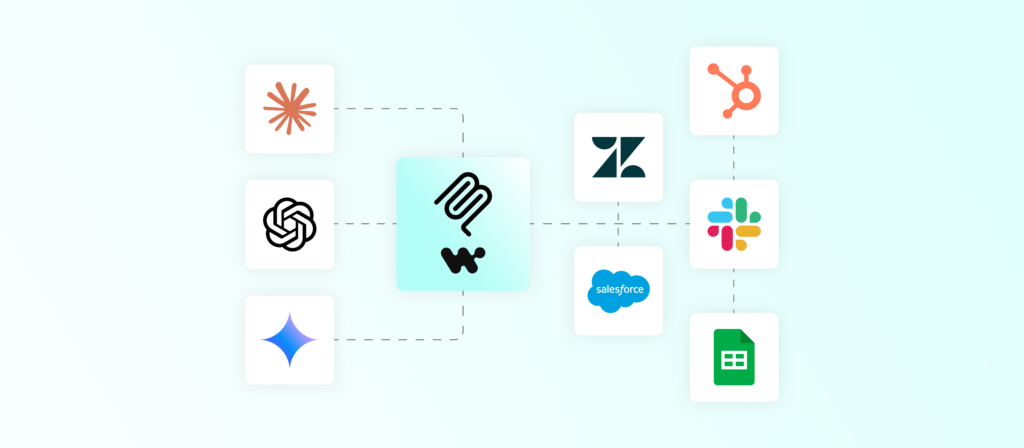As LLMs evolve into autonomous agents capable of performing real business tasks, the challenge isn’t intelligence—it’s access. Agents must discover, invoke, and orchestrate tools across systems with minimal friction. Workato is meeting that challenge head-on through its adoption of MCP (Model Context Protocol): an open protocol that standardizes how LLMs and agents interact with external tools.
Originally proposed by Anthropic, MCP introduces a unified mechanism for MCP Clients—like Claude, Cursor, Windsurf (and even LLM APIs)—to discover and invoke tools exposed by MCP servers. This eliminates the need for custom integrations or custom-built wrappers, reducing development time and accelerating connectivity
See the full breakdown of Workato Enterprise MCP here.
At Workato, we see massive potential for MCP across the platform in these core areas:
API Collections as MCP Servers: Reuse Without Rebuild
Customers who have invested in API Recipes and Proxies can now convert those into MCP servers with zero rework. These existing integrations become instantly usable by Genies or external LLM agents—as skills already exposed in a standard MCP format.
For example, let’s say a customer has a set of API recipes or proxies built in Workato for Salesforce or NetSuite–they can now convert those into MCP servers. The servers expose the same functionality, but in a way that any MCP-compatible client can discover and invoke.
With MCP a user on Claude could say, “Look up the last 5 support tickets for customer X and last comment from the internal team.” Behind the scenes, that agent is calling the Zendesk MCP, chaining multiple tool calls to retrieve relevant tickets and the comments from each of them, and the system goes from being orchestrated by static logic to being orchestrated by an agent.
Why it matters:
This enables customers to reuse their existing investments and expose them as agent-ready skills without writing new code or changing underlying logic.
Workato Dev API as an Enterprise MCP Server: Automate Workato from Anywhere
With the Workato Developer API exposed as an enterprise MCP server, developers can manage their Workato assets—recipes, projects, environments—using LLM tools like Claude, Cursor, Windsurf, Cline or any compatible interface.
Why it matters:
This empowers developers to automate and extend Workato itself using natural language agents, creating a seamless development experience across automation and AI tooling. With Local MCP support, you can ensure that only the subset of relevant developers get access to Workato, with their authorization linked with the API token which guardrails against what they can do based on fine grained access control.
How this supports the enterprise
Workato is building the infrastructure necessary for organizations to move from traditional workflows to dynamic intelligent agents. Workato’s support for enterprise MCP represents a shift—from API-driven platforms to an agent-ready infrastructure. By aligning with open standards like MCP, we ensure:
- Agent interoperability across LLM providers, platforms, and tools
- Reduced development friction through standardized interfaces
- Rapid reuse of existing assets as agent-callable skills
- Enterprise control and security with governance over which agents can access which tools
Together, this forms the basis of a secure, scalable, and extensible agent ecosystem—built for real business impact.
Watch how Claude uses Workato Enterprise MCP to securely access Salesforce data and trigger enterprise workflows—no custom integration required.
As Genies evolve to operate natively within the MCP ecosystem, Workato has two powerful capabilities on the horizon—enabling deeper interoperability and greater flexibility across agentic systems.
Genies as Enterprise MCP Clients: Expanding Agent Reach
Workato’s Genies—the AI-powered agents that drive autonomous workflows—can now act as MCP clients. This means Genies can interface directly with any third-party or customer-hosted MCP server, invoking actions, retrieving data, or triggering workflows.
Why it matters:
This unlocks access to the rapidly growing ecosystem of MCP-compatible servers, giving Genies the ability to integrate with systems without requiring any additional development. You can link to any MCP server from providers like Intercom, Plaid, Stripe, etc. and these capabilities are now available to your Genies instantly, but still respecting the access that you have defined for your Genies.
Genies as Enterprise MCP Servers: Making Workato Agents Accessibly Everywhere
Genies themselves can also be exposed as MCP servers —turning them into callable agents for external systems. Whether it’s Claude, Cursor, or any MCP client, external agents can now invoke Genies to perform enterprise-grade automations and orchestration.
For example, from Cursor a developer can talk to their Infra Genie to quickly run through some additional end to end tests, trigger deployments or even request access to a new repository. A marketing manager on Claude can interface with their Campaign Management Genie and run their campaigns, access previous performance reports or even request for additional assets.
Why it matters:
This makes Genies not only limited within the Workato ecosystem but participants in broader landscapes, allowing Workato-powered skills and workflows to be triggered from any MCP client.
Conclusion: Workato + Enterprise MCP = AI-Ready Enterprise Orchestration
The future of automation is agentic—and it needs more than intelligence. It needs access, security, and interoperability.
With Enterprise MCP, Workato opens the door for any compliant server or client to connect into thousands of systems, reuse existing API collections, trigger workflows, and scale securely. Whether building with Genies or integrating with Claude and Cursor, you’re not starting from scratch. Workato’s platform is the connective tissue of the modern agent ecosystem.
This is the second blog in our series, AI at the Core. Stay tuned for future blogs that continue to explore how embedded AI is transforming how teams build, scale, and evolve automation.
